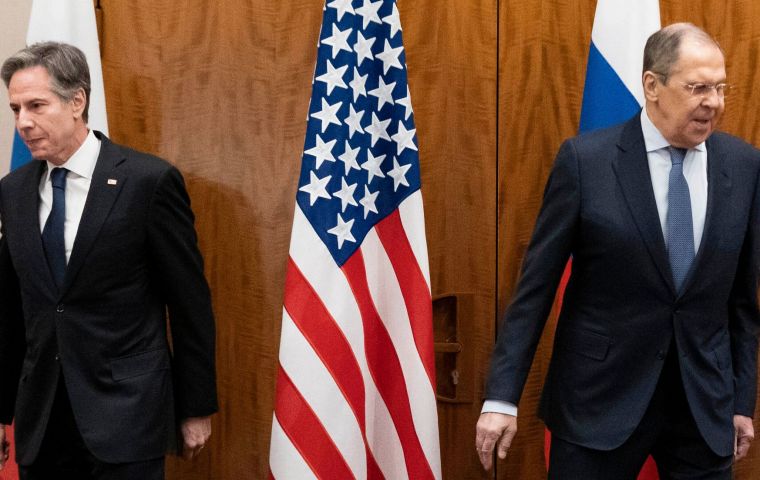MercoPress. South Atlantic News Agency
Little progress results from US, Russia's top diplomats meeting in Geneva
 Lavrov explained NATO was created as a tool against the Soviet Union and it has now shifted as one against Russia
Lavrov explained NATO was created as a tool against the Soviet Union and it has now shifted as one against Russia US Secretary of State Anthony Blinken and Russian Foreign Minister Sergey Lavrov Friday met in Geneva to discuss the escalating military tensions in Europe, particularly about a possible invasion of Ukraine.
Blinken told Lavrov that that the Kremlin could defuse tensions and concerns about a potential invasion by removing an extraordinary deployment of troops and equipment away from Ukraine’s borders, while the Russian official conveyed Moscow’s demand for NATO to stop its continuous expansion across Europe.
”As for our principled approach to the need for NATO to stop its continuous expansion to the east, we did reiterate it. Antony Blinken reiterated his position about countries’ right to choose alliances and I, as I have already said, wondered how America was going to fulfill its obligations within the OSCE (Organization for Security and Cooperation in Europe), which were approved at the highest level along with the right to choose alliances, including the obligation not to strengthen one’s security at the expense of the security of others. He promised to explain the US attitude to the implementation of this obligation,“ Lavrov noted.
The meeting took place at a time when most western sources expect Moscow to launch an incursion into Ukraine within a month’s time.
The Russian top diplomat once again explained why the issue of NATO’s expansion was crucial for Moscow. ”As for the need to stop NATO’s expansion, many are asking why we view it as crucial. It’s simply because the bloc was initially aimed against the Soviet Union and now it acts against Russia, which is what its doctrinal documents say,“ Lavrov said.
”Here is an example: when Eastern European nations, namely the Poles and the Baltic states, were striving to join NATO, we warned the West that it would be a mistake as it would in no way enhance NATO’s security and would only fuel extremist sentiment. However, we were repeatedly assured that it was the other way around and when those countries joined NATO, their Soviet-era phobias would wane and they would turn into our peaceful neighbors. However, the opposite happened,” Lavrov insisted.
“If Russia wants to begin to convince the world that it has no aggressive intent toward Ukraine, a very good place to start would be by deescalating by bringing back and removing these forces from Ukraine’s borders,” Blinken said.
“We and all of our allies and partners are equally committed to making sure we are doing everything possible to make clear to Russia that there will be a swift, severe and united response to any form of aggression by Russia directed to Ukraine,” he added.
Since 2002, Ukraine has sought entry into NATO, where the group’s Article 5 clause states that an attack on one member country is considered an attack on all of them. When asked about those demands on Friday, Blinken said the U.S., as well as the NATO alliance, would not negotiate the terms of member entry with the Kremlin.
Before heading to Switzerland, Blinken met with Ukrainian President Volodymyr Zelenskyy and Foreign Minister Dmytro Kuleba in Kyiv in order to reaffirm Washington’s commitment to a sovereign Ukraine. Blinken also met with German Foreign Minister Annalena Baerbock. “These are difficult issues we’re facing. Resolving them won’t happen quickly. I certainly don’t expect we’ll solve them in Geneva,” Blinken said while in Berlin.
“My guess is he will move in, he has to do something,” US President Joseph Biden had said Wednesday when asked about the Russian forces positioned along Ukraine’s border. “It is going to be a disaster for Russia if they further invade Ukraine. Our allies and partners are ready to impose a severe cost on Russia and the Russian economy,” Biden went on.




Top Comments
Disclaimer & comment rulesCommenting for this story is now closed.
If you have a Facebook account, become a fan and comment on our Facebook Page!